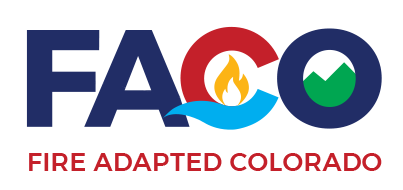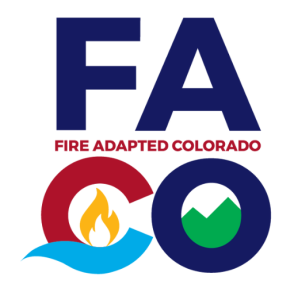Growing Wildfire Adaptation: The Case of Two Rivers
Fire Adapted Colorado and our membership of wildfire resilience leaders in Colorado are growing in tandem. In the past several years, wildfire collaborative groups have coalesced around the state. New(ish) groups include the Routt County Wildfire Council, Clear Creek Watershed Forest Health Partnership, Boulder Fireshed Collaborative, Four Rivers Resilient Forest Collaborative, Eagle County Wildfire Collaborative (re-visioning), Roaring Fork Valley Wildfire Collaborative, and the Two Rivers Wildfire Coalition, in addition to many more longstanding wildfire collaborative groups across Colorado. FACO supports and follows the development of these new partnerships. We’ve shared example bylaws and Memorandums of Understanding, job descriptions for initial coordinators, provided one-on-one guidance, and presented or facilitated early group meetings.
Two Rivers Wildfire Coalition
The Two Rivers Wildfire Coalition is a great example of a burgeoning leader in community and landscape wildfire resilience supported by the FACO network. Born of Colorado River riparian corridor wildfires in Mesa County, Ellis Thompson-Ellis at Grand Junction Fire, Pete Firmin, with Colorado Parks and Wildlife who manages many riverside parks, and other stakeholders came together to address this hazard threatening their community. The nearby Eagle County Community Mitigation Manager and board Chair for FACO, Eric Lovgren, provided consultation and attended formative meetings.
State Conference and Building a Neighborhood Ambassador Program
In 2019, the planning team for the 2020 Colorado Wildland Fire Conference began targeting the west slope for a venue. Given this new group forming in Mesa County and the accessibility of Grand Junction, Eric Lovgren reached out and the TRWC came through with planning team support on everything from helping line up the venue, to outreach, and solicitation of local sponsorships and prizes… then that thing that hit in 2020 happened and the conference went virtual. TRWC was instrumental in hosting when we picked up planning the in-person conference in Grand Junction again which went off without a hitch in September 2021. Ellis and another member of the coalition were able to attend the pre-conference “Building Your FAC Neighborhood Ambassador Approach” workshop, and immediately began acting on their plan to leverage volunteers in their wildland urban interface. Just over a year later, TRWC has two high-wildfire-risk neighborhoods who are making headway and have started fuels mitigation work in their neighborhoods.
Opportunity Fund Support
Two Rivers came on the scene with a strong connection to FACO, through the early mentorship from Eagle County, and they have never hesitated to reach out for support or to borrow what is working in other places and make it their own. The Coalition put in for an Opportunity Fund award in 2020 to support one of the coalitions first mitigation projects thinning riparian vegetation and improving fire engine access to the river. Unfortunately, the federal funding available for that award wasn’t able to go toward the desired gravel for the water access site. TRWC accomplished that project anyway and came back again in 2021 to request support with another mitigation project. With more flexible funding made possible by the Argosy Foundation, Two Rivers was awarded funds to launch their “Make Some Noise” outreach program. Through this program, when TRWC partner agencies are conducting wildfire fuels reduction, TRWC is working to connect the surrounding neighborhoods with information about the project and resources to support them in reducing the risk of wildfire on their own properties. TRWC developed print and online resources and interpretive signage for a mitigation project in a state park that gets heavy pedestrian traffic.
Joining the FACO Board of Directors
Ellis was an instrumental planning team member for the Colorado Wildland Fire Conference in Grand Junction, and she demonstrated a natural talent for network engagement. So she was invited to apply for the FACO board when there was an opening. Following the successful conference, Ellis agreed to join the board which guides the organization. While some early career mitigation specialists have been reluctant to dive into Fire Adapted Colorado participation because they fear they don’t know enough yet, bringing in new people and new perspectives is a key part of a healthy network. And these new members have a lot to gain, with immediate access to scores of wildfire mitigation professionals to call upon. In the case of joining the board, these members naturally have even more engagement and support of leadership.
Two Rivers Hosts ‘Assessing Structure Ignition Potential’ Course
Improving home site visit programs has been a long standing interest area for FACO and our members, harkening back to FACO’s first Learning Exchange on the methods, tools, and technology that practitioners across the state were employing to conduct and track these assessments. The Two Rivers Wildfire Coalition recognized development of a site assessment program as an important next step in providing services to Mesa County WUI residents. With some hints that the Colorado State Forest Service wanted to sponsor NFPA ‘Assessing Structure Ignition Potential’ course around the state and direct requests by several FACO members wanting to train up their staff, FACO reached out to solicit interest in hosting. Ellis jumped on the opportunity and the State Forest Service was able to pick up the course cost, with FACO just doing minimal facilitation to get the ball rolling, invite attendees, and insist that the site-assessment instruction in the field be included in light of the CoVID hesitancy. Ellis was able to work on the waivers and secure residences for the field portion and the instructor, Tom Welle, indicated that it was the most diverse class he’d ever taught, with coalitions/members, firefighters, nonprofits, and more.
Now that many of the coalition have the training to identify structure ignition vulnerabilities, the next step is to introduce them to tools and systems to support an assessment program. We will have an assessment program show and tell during an upcoming FACO West Slope Meet Up on January 31st, weather permitting, where Bill Hahnenberg, a retired USFS fire professional and our other board member who lives in Grand Junction, and Ellis have graciously accepted hosting responsibilities again.
Welcoming Ellis Thompson-Ellis as FACO’s Board Chair
Eric Lovgren transitioned from the FACO Board Chair position, in January 2023, back to being a regular contributing Director on the board so he can help manage the re-launched Eagle County Wildfire Collaborative, the new Roaring Fork Valley Wildfire Collaborative, and a major update for a robust county-wide CWPP. In the meantime, Ellis has served as Vice-Chair and has stepped into the FACO Board Chair position. We’re excited to have her move into this role and to watch the growth of FACO and the Two Rivers Wildfire Coalition under her leadership.

